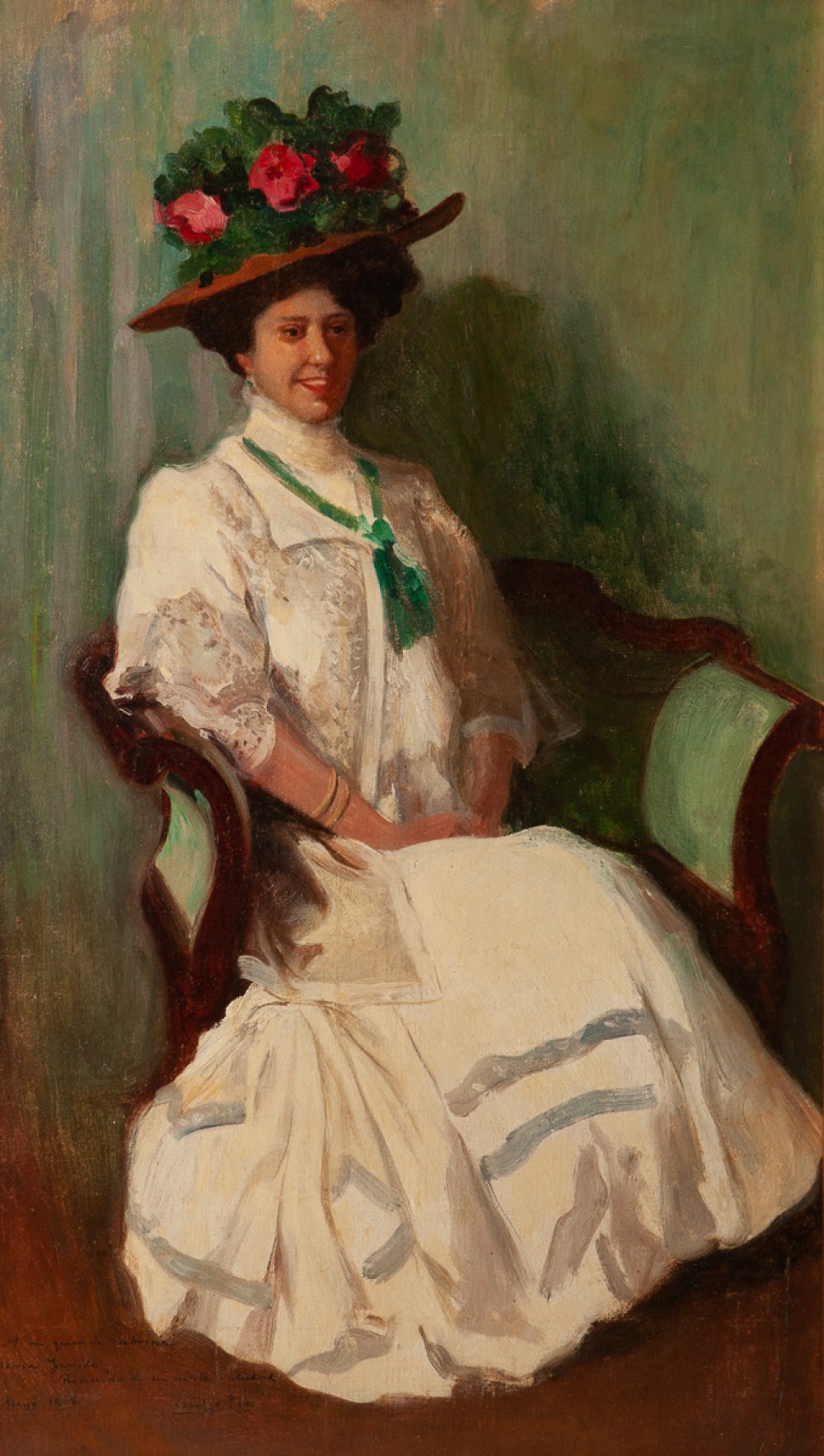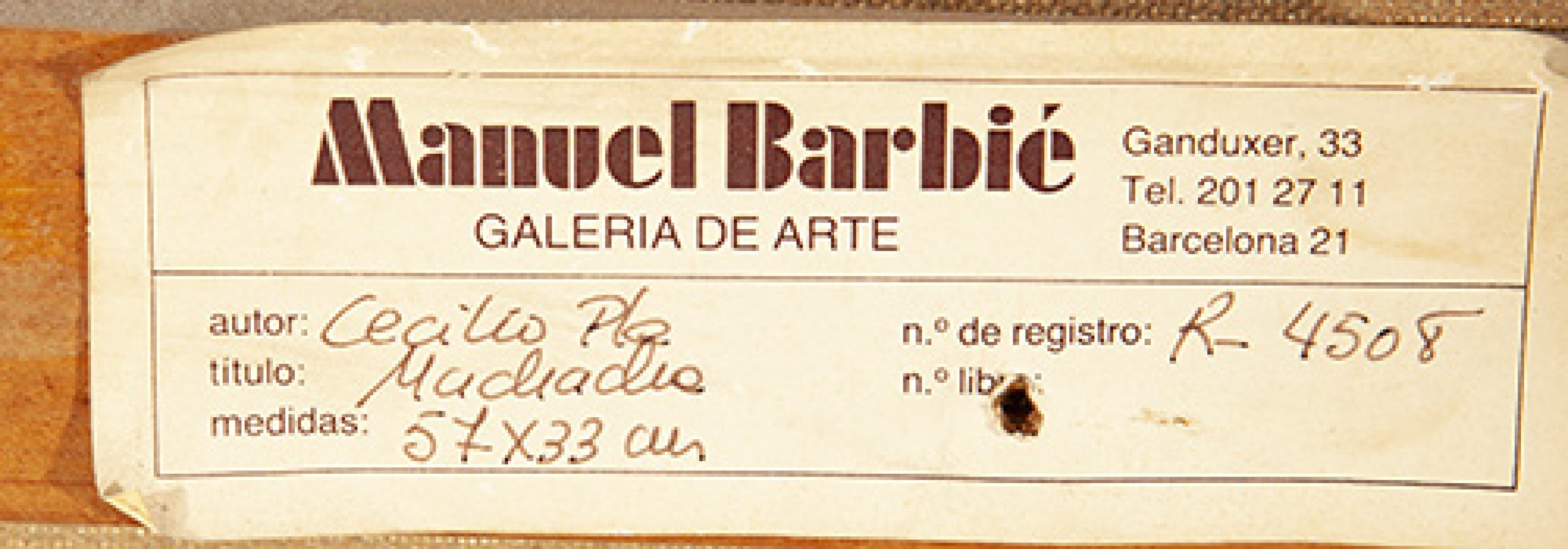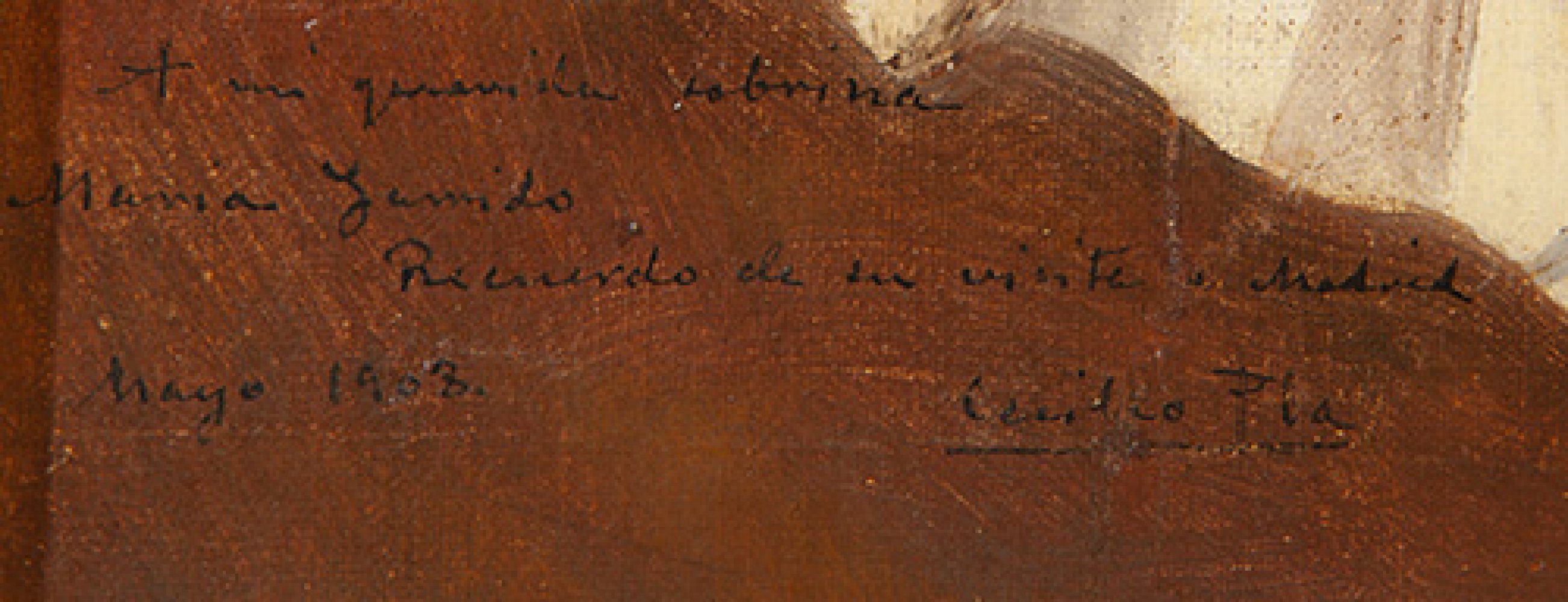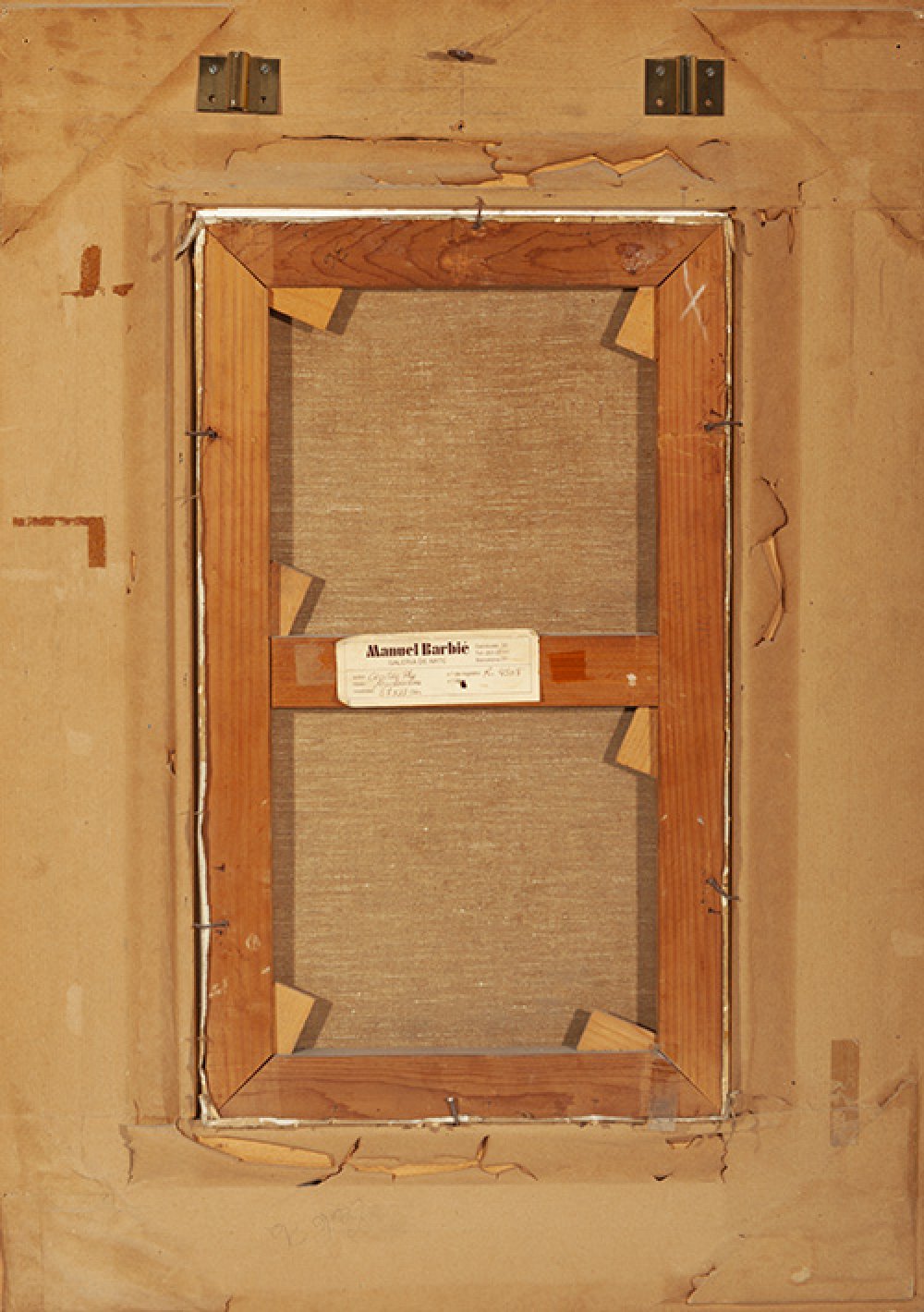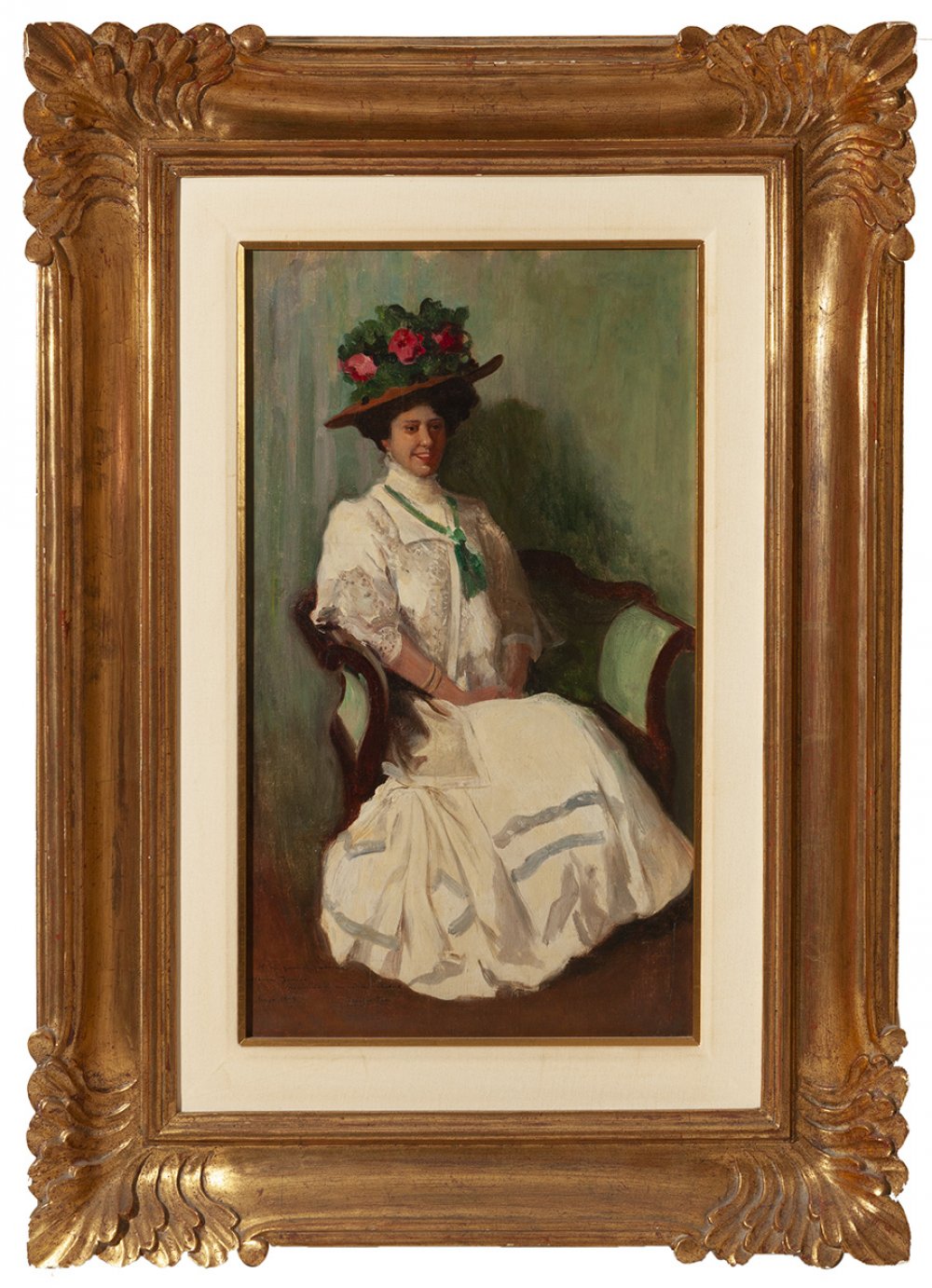20
CECILIO PLÁ GALLARDO (Valencia, 1860 - Madrid, 1934)."Lady with a Hat".Oil on canvas.Signed in the
1/5
Description
CECILIO PLÁ GALLARDO (Valencia, 1860 - Madrid, 1934).
"Lady with a Hat".
Oil on canvas.
Signed in the lower right corner.
With label of the Manuel Barbie Art Gallery on the back.
Measurements: 57 x 33 cm; 85 x 60,5 cm (frame).
Cecilio Pla began his training at the Academy of Fine Arts of San Carlos in Valencia, to later continue at the Academy of San Fernando in Madrid, where his teacher was Emilio Sala. In 1880 he made a study trip to Rome, visiting Italy, France and Portugal. From there he began to send works to the National Exhibitions of Fine Arts, being awarded a third medal in 1884 for the Italian-themed work "El Dante: círculo de los avaros", and a second medal in 1887 for the religious canvas entitled "Entierro de Santa Leocadia". In 1892 he again won a second medal for the social realist painting "Las doce (el almuerzo)" ("Twelve o'clock (lunch)"), and the same award in 1895 for a scene of marital disagreement in a bourgeois interior, "Lazo de unión" ("Bond of Union"). Pla continued to take part in the National Exhibitions throughout his life, and in 1910 he was awarded the first medal for his painting "Two Generations", characterised by the different effects of natural light that were the artist's true speciality. That same year, 1910, he replaced his former teacher Emilio Sala in the class of colour aesthetics and pictorial procedures at the San Fernando Academy, where he taught Juan Gris, Francisco Bores, Pancho Cossío and José María López Mezquita, among others. It was then that he published his "Cartilla de arte pictórico". Pla also took part in international competitions, being awarded a medal of honour at the Universal Exhibition in Paris in 1900. In 1924 he was appointed a member of the San Fernando Academy. He alternated his teaching activity with painting, as well as collaborating as an illustrator with publications such as "La Ilustración Española y Americana", "Blanco y Negro" and "La Esfera". He also produced posters, such as the one for the Carnival of the Círculo de Bellas Artes in 1892, and took part in mural decorations, including the ceiling of the hotel of the Infanta Isabel de Borbón, the Madrid Casino, the Círculo de Bellas Artes and the palace of the Dukes of Denia. Considered the greatest exponent of Valencian modernist painting, he nevertheless embraced different trends, from the academicism and costumbrismo of his beginnings to the Wagnerianism and luminism of his coastal views painted in Valencia. Cecilio Pla is currently represented in the Prado Museum, the Thyssen-Bornemisza Museum, the Fine Arts Museums of Valencia, Zaragoza, Santander and Bilbao, the Círculo de Bellas Artes in Madrid, Valencia City Council and the Royal Academy of Fine Arts of San Carlos, among other public and private collections, such as the UEE Collection. In 1999, the Mapfre Foundation devoted an extensive retrospective to him.
"Lady with a Hat".
Oil on canvas.
Signed in the lower right corner.
With label of the Manuel Barbie Art Gallery on the back.
Measurements: 57 x 33 cm; 85 x 60,5 cm (frame).
Cecilio Pla began his training at the Academy of Fine Arts of San Carlos in Valencia, to later continue at the Academy of San Fernando in Madrid, where his teacher was Emilio Sala. In 1880 he made a study trip to Rome, visiting Italy, France and Portugal. From there he began to send works to the National Exhibitions of Fine Arts, being awarded a third medal in 1884 for the Italian-themed work "El Dante: círculo de los avaros", and a second medal in 1887 for the religious canvas entitled "Entierro de Santa Leocadia". In 1892 he again won a second medal for the social realist painting "Las doce (el almuerzo)" ("Twelve o'clock (lunch)"), and the same award in 1895 for a scene of marital disagreement in a bourgeois interior, "Lazo de unión" ("Bond of Union"). Pla continued to take part in the National Exhibitions throughout his life, and in 1910 he was awarded the first medal for his painting "Two Generations", characterised by the different effects of natural light that were the artist's true speciality. That same year, 1910, he replaced his former teacher Emilio Sala in the class of colour aesthetics and pictorial procedures at the San Fernando Academy, where he taught Juan Gris, Francisco Bores, Pancho Cossío and José María López Mezquita, among others. It was then that he published his "Cartilla de arte pictórico". Pla also took part in international competitions, being awarded a medal of honour at the Universal Exhibition in Paris in 1900. In 1924 he was appointed a member of the San Fernando Academy. He alternated his teaching activity with painting, as well as collaborating as an illustrator with publications such as "La Ilustración Española y Americana", "Blanco y Negro" and "La Esfera". He also produced posters, such as the one for the Carnival of the Círculo de Bellas Artes in 1892, and took part in mural decorations, including the ceiling of the hotel of the Infanta Isabel de Borbón, the Madrid Casino, the Círculo de Bellas Artes and the palace of the Dukes of Denia. Considered the greatest exponent of Valencian modernist painting, he nevertheless embraced different trends, from the academicism and costumbrismo of his beginnings to the Wagnerianism and luminism of his coastal views painted in Valencia. Cecilio Pla is currently represented in the Prado Museum, the Thyssen-Bornemisza Museum, the Fine Arts Museums of Valencia, Zaragoza, Santander and Bilbao, the Círculo de Bellas Artes in Madrid, Valencia City Council and the Royal Academy of Fine Arts of San Carlos, among other public and private collections, such as the UEE Collection. In 1999, the Mapfre Foundation devoted an extensive retrospective to him.
Auction Details
Shipping
T&Cs & Important Info
Ask seller a question
CECILIO PLÁ GALLARDO (Valencia, 1860 - Madrid, 1934).
"Lady with a Hat".
Oil on canvas.
Signed in the lower right corner.
With label of the Manuel Barbie Art Gallery on the back.
Measurements: 57 x 33 cm; 85 x 60,5 cm (frame).
Cecilio Pla began his training at the Academy of Fine Arts of San Carlos in Valencia, to later continue at the Academy of San Fernando in Madrid, where his teacher was Emilio Sala. In 1880 he made a study trip to Rome, visiting Italy, France and Portugal. From there he began to send works to the National Exhibitions of Fine Arts, being awarded a third medal in 1884 for the Italian-themed work "El Dante: círculo de los avaros", and a second medal in 1887 for the religious canvas entitled "Entierro de Santa Leocadia". In 1892 he again won a second medal for the social realist painting "Las doce (el almuerzo)" ("Twelve o'clock (lunch)"), and the same award in 1895 for a scene of marital disagreement in a bourgeois interior, "Lazo de unión" ("Bond of Union"). Pla continued to take part in the National Exhibitions throughout his life, and in 1910 he was awarded the first medal for his painting "Two Generations", characterised by the different effects of natural light that were the artist's true speciality. That same year, 1910, he replaced his former teacher Emilio Sala in the class of colour aesthetics and pictorial procedures at the San Fernando Academy, where he taught Juan Gris, Francisco Bores, Pancho Cossío and José María López Mezquita, among others. It was then that he published his "Cartilla de arte pictórico". Pla also took part in international competitions, being awarded a medal of honour at the Universal Exhibition in Paris in 1900. In 1924 he was appointed a member of the San Fernando Academy. He alternated his teaching activity with painting, as well as collaborating as an illustrator with publications such as "La Ilustración Española y Americana", "Blanco y Negro" and "La Esfera". He also produced posters, such as the one for the Carnival of the Círculo de Bellas Artes in 1892, and took part in mural decorations, including the ceiling of the hotel of the Infanta Isabel de Borbón, the Madrid Casino, the Círculo de Bellas Artes and the palace of the Dukes of Denia. Considered the greatest exponent of Valencian modernist painting, he nevertheless embraced different trends, from the academicism and costumbrismo of his beginnings to the Wagnerianism and luminism of his coastal views painted in Valencia. Cecilio Pla is currently represented in the Prado Museum, the Thyssen-Bornemisza Museum, the Fine Arts Museums of Valencia, Zaragoza, Santander and Bilbao, the Círculo de Bellas Artes in Madrid, Valencia City Council and the Royal Academy of Fine Arts of San Carlos, among other public and private collections, such as the UEE Collection. In 1999, the Mapfre Foundation devoted an extensive retrospective to him.
"Lady with a Hat".
Oil on canvas.
Signed in the lower right corner.
With label of the Manuel Barbie Art Gallery on the back.
Measurements: 57 x 33 cm; 85 x 60,5 cm (frame).
Cecilio Pla began his training at the Academy of Fine Arts of San Carlos in Valencia, to later continue at the Academy of San Fernando in Madrid, where his teacher was Emilio Sala. In 1880 he made a study trip to Rome, visiting Italy, France and Portugal. From there he began to send works to the National Exhibitions of Fine Arts, being awarded a third medal in 1884 for the Italian-themed work "El Dante: círculo de los avaros", and a second medal in 1887 for the religious canvas entitled "Entierro de Santa Leocadia". In 1892 he again won a second medal for the social realist painting "Las doce (el almuerzo)" ("Twelve o'clock (lunch)"), and the same award in 1895 for a scene of marital disagreement in a bourgeois interior, "Lazo de unión" ("Bond of Union"). Pla continued to take part in the National Exhibitions throughout his life, and in 1910 he was awarded the first medal for his painting "Two Generations", characterised by the different effects of natural light that were the artist's true speciality. That same year, 1910, he replaced his former teacher Emilio Sala in the class of colour aesthetics and pictorial procedures at the San Fernando Academy, where he taught Juan Gris, Francisco Bores, Pancho Cossío and José María López Mezquita, among others. It was then that he published his "Cartilla de arte pictórico". Pla also took part in international competitions, being awarded a medal of honour at the Universal Exhibition in Paris in 1900. In 1924 he was appointed a member of the San Fernando Academy. He alternated his teaching activity with painting, as well as collaborating as an illustrator with publications such as "La Ilustración Española y Americana", "Blanco y Negro" and "La Esfera". He also produced posters, such as the one for the Carnival of the Círculo de Bellas Artes in 1892, and took part in mural decorations, including the ceiling of the hotel of the Infanta Isabel de Borbón, the Madrid Casino, the Círculo de Bellas Artes and the palace of the Dukes of Denia. Considered the greatest exponent of Valencian modernist painting, he nevertheless embraced different trends, from the academicism and costumbrismo of his beginnings to the Wagnerianism and luminism of his coastal views painted in Valencia. Cecilio Pla is currently represented in the Prado Museum, the Thyssen-Bornemisza Museum, the Fine Arts Museums of Valencia, Zaragoza, Santander and Bilbao, the Círculo de Bellas Artes in Madrid, Valencia City Council and the Royal Academy of Fine Arts of San Carlos, among other public and private collections, such as the UEE Collection. In 1999, the Mapfre Foundation devoted an extensive retrospective to him.
31st August -19th & 20th Century Arts
Sale Date(s)
Venue Address
Aragón 346, Barcelona
Calle Velázquez 7, Madrid
Carrer de Cirilo Amorós 55, Valencia
Barcelona
08009
Spain
General delivery information available from the auctioneer
Setdart offers Worldwide shipping
PICK UP IN ROOM: You can come and pick up your lots in our offices (Barcelona, Madrid or Valencia). At the moment of the withdrawal, you will be able to accept the current conditions of the lot by means of a document that you will sign.
YOU CAN SEND ANOTHER PERSON TO PICK UP: This person must present a signed authorization that you can find in our web page by accessing from BUY AT SETDART- LOGISTICS-DOWNLOAD AUTHORIZATION DOCUMENT. You can also send an e-mail with the requested data in AUTHORIZATION DOCUMENT to admin@setdart.com
Important Information
25% buyer´s premium
21% buyer´s premium at www.setdart.com











